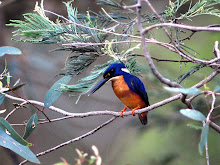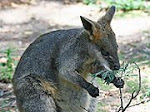I haven't posted for a while as the weather has been and is so terribly dry and hot. The birds seem to conserve their energy on days like this, and don't seem so visible (or audible) ... and I am also less motivated to walk abroad.
But at least today I witnessed a colourful group of rainbow parakeets, along with a couple of native miners [manorina melanocephala], noisily feeding in some young eucalyptus trees. Because the trees weren't tall I was able to get a good look at the birds. I noticed that the miners can feed upside down, just like the parakeets.
There were no blooms on these trees, so they must have been feeding on insects.
I hardly ever see native miners around my particular neighbourhood, so this was an enjoyable event. I find their grey plumage much more visually appealing than the dark brown Indian myna, with which they are often confused. My mother in Queensland calls them "mickies", and loves them dearly.
I also noticed that both species of bird chose the eucalypts for their foraging, and ignored the native sheoak [allocasuarina] beside them. There must be some insect that targets the eucalypts in particular.
A few nights ago I also glimpsed an owl or frogmouth of some kind in the park at the end of the street. I couldn't see it clearly enough to identify, but its silent, gliding flight on large wings was unmistakable. It was a windy night after a hot day, with a deliciously cool breeze blowing through the trees. I felt privileged to see this magnificent night bird.
Sunday, January 25, 2009
Thursday, January 15, 2009
Kookaburras!
While walking this morning, I checked on the kookaburras which I've previously noticed tend to perch in a couple of exotic pine trees, in a yard near my house. I spied one, 25-30 feet up, being sqawked at aggressively by an Indian myna. Eventually this harrassment succeeded, and it flew to a nearby Norfolk Island pine with its mate. But they were not safe there either! A peewee took up the sqawking and drove the kookaburras away completely ;-(
But I know they'll be back.
While staring up at the birds I was joined by a man who'd just moved in to a nearby house. He introduced himself, and told me the kookas had woken him at 5 o'clock this morning with their cackling....
For anyone who's never heard this sound, I can tell you it's the quintessential sound of Australia. Here is a link to the website of the Bird Observers' Club of Australia, which has recordings of Australian bird calls: http://www.birdsinbackyards.net/finder/display.cfm?id=18
Birds in Backyards - Magpie-lark (Grallina cyanoleuca) Fact sheet
But I know they'll be back.
While staring up at the birds I was joined by a man who'd just moved in to a nearby house. He introduced himself, and told me the kookas had woken him at 5 o'clock this morning with their cackling....
For anyone who's never heard this sound, I can tell you it's the quintessential sound of Australia. Here is a link to the website of the Bird Observers' Club of Australia, which has recordings of Australian bird calls: http://www.birdsinbackyards.net/finder/display.cfm?id=18
Birds in Backyards - Magpie-lark (Grallina cyanoleuca) Fact sheet
Sunday, January 11, 2009
A sad discovery.....
Today I found a dead ring-tailed possum in a local street. It had no sign of injury - it wasn't "road kill" (that phrase makes me shudder.) At least it was proof positive that ringies live around here. I buried it in my garden.
On a more positive note, I've seen and heard the kookaburras again nearly every day lately. I also spied two crested pigeons in the park.
Yet the grass is dying from the summer dryness and there is no prospect of rain.... At least the temperatures have been delightfully mild - so far.
On a more positive note, I've seen and heard the kookaburras again nearly every day lately. I also spied two crested pigeons in the park.
Yet the grass is dying from the summer dryness and there is no prospect of rain.... At least the temperatures have been delightfully mild - so far.
Friday, January 9, 2009
Aggressive pests!
 This picture about says it all, I think! Indian Mynas, introduced by some twit 1n 1860, are multiplying rapidly across eastern Australia, including my neighbourhood, killing or forcing out native birds and mammals.
This picture about says it all, I think! Indian Mynas, introduced by some twit 1n 1860, are multiplying rapidly across eastern Australia, including my neighbourhood, killing or forcing out native birds and mammals.They are very aggressive, intelligent, quick, and hardy - a formidable foe to conservationists.
I notice that where there are no indigenous trees or shrubs, there are many Mynas and no other birds. They seem especially fond of the sterile kind of "garden" currently in fashion, which has large areas of concrete or tiles, surrounded by a very limited range of exotic plants arranged in rigid rows.
Labels:
conservationist,
exotic,
introduced,
myna,
pest,
species,
sterile
Sunday, January 4, 2009
I'm continually amazed...
...at the number of indigenous birds that manage to survive here in suburbia, in spite of the predation by Indian Mynahs, cats, dogs, foxes and so on.
I've observed kookaburras, butcherbirds, thornbills, ravens, red-wattle birds, spotted turtle-doves and tawny frogmouths right in my own small back yard. As well I've seen red-browed firetails [finches], eastern yellow robins, fairy wrens, and various native ducks in a nearby reserve.
Recently I also saw a crested pigeon in the park at the end of our street. Here's a link of some excellent pictures of Australian native pigeons, including the crested: http://www.tabblo.com/studio/stories/view/209185/?nextnav=favs&navuser=13800
Today I glimpsed an eastern spinebill in the street.
Here's a link to an old blog I just discovered, by a Melbourne bloke: http://home.iprimus.com.au/punkclown/Punkclown/DifferentSongs.htm It contains audio of native bird songs from the Melbourne area.
Enjoy!
I've observed kookaburras, butcherbirds, thornbills, ravens, red-wattle birds, spotted turtle-doves and tawny frogmouths right in my own small back yard. As well I've seen red-browed firetails [finches], eastern yellow robins, fairy wrens, and various native ducks in a nearby reserve.
Recently I also saw a crested pigeon in the park at the end of our street. Here's a link of some excellent pictures of Australian native pigeons, including the crested: http://www.tabblo.com/studio/stories/view/209185/?nextnav=favs&navuser=13800
Today I glimpsed an eastern spinebill in the street.
Here's a link to an old blog I just discovered, by a Melbourne bloke: http://home.iprimus.com.au/punkclown/Punkclown/DifferentSongs.htm It contains audio of native bird songs from the Melbourne area.
Enjoy!
Don't get me wrong....
I'm not a purist to the point of wanting to cut down non-native trees or whatever - I'm a pragmatist, and I think we need all the trees we can get!!
I live in a suburb with a lot ofwell-established exotic trees, which provide desperately-needed shade in our hot, dry summers, as well as nesting sites for birds and possums. Naturally they also convert carbon dioxide into oxygen without which we humans could not live. It would take at least 3 decades to grow replacement trees, which is simply not practicable.
We should be replacing diseased or dangerous exotics with indigenous species of course, but councils aren't even doing that.
I live in a suburb with a lot ofwell-established exotic trees, which provide desperately-needed shade in our hot, dry summers, as well as nesting sites for birds and possums. Naturally they also convert carbon dioxide into oxygen without which we humans could not live. It would take at least 3 decades to grow replacement trees, which is simply not practicable.
We should be replacing diseased or dangerous exotics with indigenous species of course, but councils aren't even doing that.
Saturday, January 3, 2009
My first blog...
To start with, I'm Australian, in my fifties, moderately left-wing, and firmly committed to conservation of what's left of Australia's indigenous species of plants and animals.
I support Aboriginal land rights.
I teach English as a second language to adults, and I vehemently oppose the Howard government's treatment of refugees. So far the Rudd govt hasn't done much different and I am not impressed with their record.
I support Aboriginal land rights.
I teach English as a second language to adults, and I vehemently oppose the Howard government's treatment of refugees. So far the Rudd govt hasn't done much different and I am not impressed with their record.
Subscribe to:
Comments (Atom)









